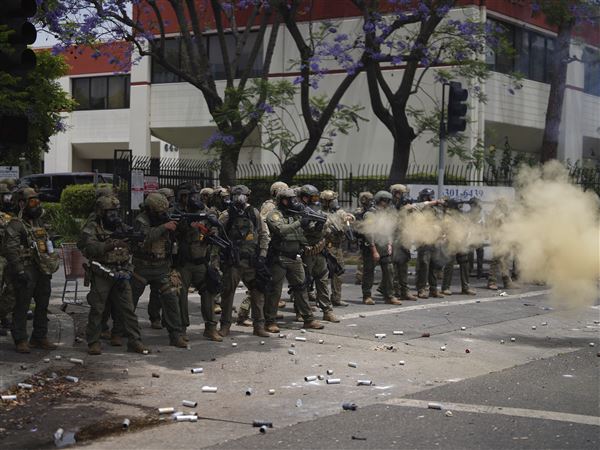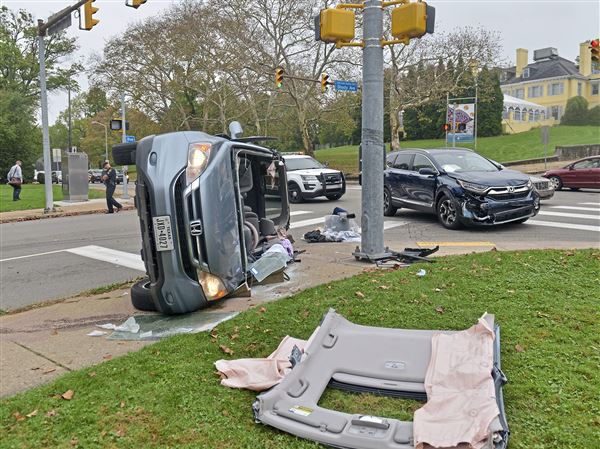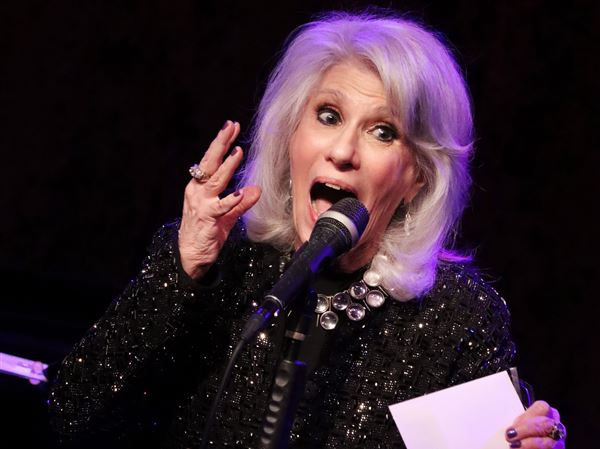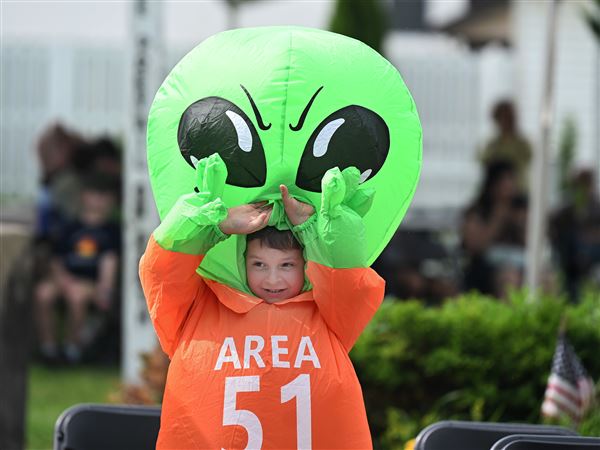Snowmageddon didn't make for an easy launch Feb. 5 of the first major exhibition of the Associated Artists of Pittsburgh's celebratory centennial year, but it showed the spirit and fellowship that permeates the organization.
The opening reception for "Exchange: Emerging and Experienced Artists Come Together" went on as scheduled in spite of the threatening storm, out of respect for the artists exhibiting and for family members who had traveled from out of town for the event. Many attendees left before roads became impassable, but the person responsible for closing down the 937 Liberty Ave. venue, exhibition chair Anna Marie Sninsky, wasn't so fortunate. She spent the night in a Marriott, stopped by a foot of snow 3 miles from home.
But that's all in a day's work for the largely volunteer-run anniversary effort that has coordinated 70 exhibitions at local museums and galleries, fed a VisitPittsburgh cultural tourism campaign, and planned a symposium among other events. AAP school outreach programming also led to a member-directed cataloging of artworks purchased over decades by the Friends of Art for the Pittsburgh Public Schools.
The year's highlight will be summer's Annual Exhibition, always a hometown favorite that promises to be more gala than ever. It will be held at Carnegie Museum of Art, where last Thursday, 100 years to the day since its founding, AAP held a brief "15 minutes of fame" birthday party, a reference to the most famous member to have exhibited in an Annual, Andy Warhol.
and Experienced Artists
Come Together'
- Where: Pittsburgh Cultural Trust Gallery, 937 Liberty Ave., Downtown.
- When: Through April 18 and for the April 23 Gallery Crawl.
- Hours: 11 a.m.-6 p.m. Wednesday and Thursday, 11 a.m.-8 p.m. Friday and Saturday, 11 a.m.-5 p.m. Sunday.
- Admission: Free.
- Catalog: Illustrated with notes on each collaboration, paper, $5 suggested donation.
- Events: For a listing of 70 exhibitions featuring AAP member artists go to www.aapgh.org.
- Information: 412-361-1370.
Robust and varied, "Exchange" is a good kickoff, reflecting the talents of long-standing members and the desire of the organization to draw in and to mentor artists at the beginnings of their careers.
The sculpture "Divergence," a 7-foot-high steel arch with suspended glass elements by Bill Zarvis and Drew Hine, exudes solidity and is inspired by Pittsburgh's rivers and glass and steel industries. To the contrary, Garth Jones' and Alexandra Etschmaier's installation "Desk, Chair, Vase #2, Lifeform" plays with expectations to make its impact. Ms. Etschmaier's flowing sisal desktop and seat deconstruct Mr. Jones' furniture forms while his vase and Ms. Etschmaier's small sculpture, representative of their more typical work, provide points of departure.
Photographers Lugene Bruno and Sandra Moore created "Juxtapositions," a 91-by-84-inch movement-infused collage of hundreds of colored photographic details that reflect their interest in nature and ecology, as well as their experience with quilt and mosaic work, respectively.
While their end product was unlike anything Ms. Bruno and Ms. Moore would have made on their own, contributions by Benjamin Matthews and Alberto J. Almarza to "Jellyvision Workspace" are true to their usual stylistic expression -- Mr. Matthews' distressed posters and Mr. Almarza's magical worlds -- but join appropriately and seamlessly to new effect.
Dorothy Forman has been working within a symbolic narrative for some time, but her collaboration with Mandy Chesney exploded it into the four-part "Blue Girl Series" reminiscent of Art Brut. In it, fantastical oversized images rise from pain and metamorphose into a soaring bird resplendent as the Quetzal Coatl, transcendent as a phoenix.
Deanna Mance reinterpreted the almost iconic photograph of a decimated industry, "Steel Temple Ruins" by Aaronel deRoy Gruber, in "Temples Revised" as a vibrant candyland of color and possibility by concentrating on its formal qualities. The two works are displayed side by side. Their sculpture, "Mixologists," is equally playful.
Established artists were chosen from those who had been juried into the most annuals since 1990, said exhibition co-chair Robert Qualters, who himself has a long history of collaboration and provided the idea for the show. Emerging artists came from the latest membership screening. Those selected from each category found their own partners.
An emerging artist, Juliana Morris, drew in the flashiest participant, ex-husband Burton Morris, who is nationally known for his bold graphic designs for splash events such as the Academy Awards and Summer Olympic Games. Their resultant bright giclee print, "Multiverse," blends his imagery with her metaphysically inspired patterns.
Other teams chose to maintain individuality within presentations that project larger ideas. Adrienne Heinrich paired with architect daughter Linda Heinrich to probe, in "Mnemonic Resurrection," the way we construct memory and, in effect, our cosmos, and how that's influenced by time. Adrienne's cast silicone pieces, such as "Diary of a Father, Memory," which linger in liminal zones, offer contemplative counter to Linda's cartoon-inspired nine-paneled drawing "Mr. Nemo Wakes Up (Homage to Winsor McCay)," perhaps a double-entendre on perspective.
More subtly, Richard A. Stoner's observant black-and-white landscape photographs and wife Eileen M. Stoner's elegant watercolor studies of grapes explore natural patterns. Karen Kaighin and Lily Bonga turn their cameras on Pittsburgh to discover, respectively, land that steel picked over and left behind, but also the buzz of South Side night life.
Constance Merriman and Noel Hefele address place, time and even globalization in "Dwelling," projected synchronized photographs taken from windows of their homes in Pittsburgh and in England. The sun lights up one side of the Earth as the other goes dark, making a little more visceral the experience of a friend across space.
Also exhibiting are Marcia Comer and Mark McLaughlin, Suzanne Colvin and Robert Robinson, Jeannie McGuire and Phil Salvato, Garry Pyles and Carin Mincemoyer, Joan Iversen Goswell and son Michael Lorenz Goswell, Gerry Florida and Tom Ladousa, Randie Snow and Kyle Ethan Fischer, Kitty Spangler and Tiffany Whitfield, and Kathryn Scimone Stanko and Susan Winicour.
President Kathleen Zimbicki, who has been a member since the 1970s, said the AAP is "known as an old ladies' group, and it's really not true because we do have a lot of young people. We also encourage diversity in our membership, as well as new media. It's like Pittsburgh being thought of as the Smoky City, and I wish that rumor would go away."
This show should help to dispel it.
The Liberty Avenue location must be bittersweet for AAP, which from 1988 to 2003 owned the building, now a property of the Pittsburgh Cultural Trust. But it's an example of what AAP (one of the founders of what has become the Pittsburgh Center for the Arts where it again has an office) has overcome in a century that has had more ups than downs.
With approximately 450 members, the AAP makes claim to being the oldest artist-run organization in the nation. Last week, U.S. Rep. Mike Doyle of Swissvale issued a citation commending the AAP "upon its centennial for its exceptional work in advancing artists and their work in the community." Also, Pittsburgh City Council declared March 4 "Associated Artists of Pittsburgh Day."
An exhibition like "Exchange," which benefits old and new members without hierarchy, illustrates one reason for its honors and its longevity.
First Published: March 7, 2010, 10:00 a.m.

















